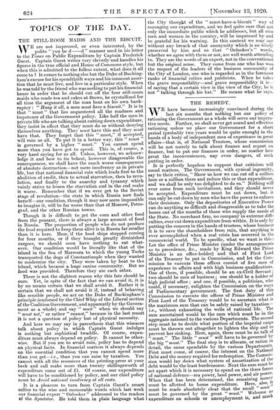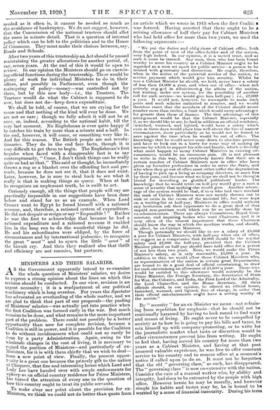THE REMEDY.
WE have become increasingly convinced during the last six months that nothing but our policy of rationing the Government as a whole will serve our impera- tive needs. Further, we shall never get sound and effective rationing unless we place our Government for a short period (probably two years would be quite enough) in the hands of a body of independent men of experience in great affairs—that is, of National Trustees, whose commission will be not merely to talk about finance and report on finance, but to put our finances in order, no matter how great the inconveniences, nay even dangers, of such putting in order. It is perfectly hopeless to suppose that criticism will mend matters. The Government, with cynical ingenuity, say to their critics, "Show us how we can cut off a million here or a million there and reduce this or that expenditure, and we shall be only too delighted to do so." Nothing will ever come from such invitations, and they should never be accepted. Expenditure must be cut down, but it can only be cut down by men who have the power to enforce their decisions. Only the depositories of Executive Power can do anything so difficult and disagreeable as to take the bones out of the mouths of those who supply the needs of the State. No merchant firm, no company in extreme diffi- culties, ever cut down expenditure from within. It is only by putting the concern in the hands of trustees, whose business it is to save the shareholders from ruin, that anything is ever accomplished when a real crisis has occurred in the commercial world. To be specific, what we want is this : Let the office of Prime Minister (under the arrangements as to precedence, &c., made by King Edward the Prune Minister is an office-holder) and that of First Lord of the Treasury be put in Commission, and let the Com- mission to execute these offices consist of five men of experience in affairs and with high business qualifications. One of them, if possible, should be an ex-Civil Servant ; two should be men of business ; one should be a holder of high judicial office ; and one, if possible, a politician, who could, if necessary, enlighten the Commission on the wave of Parliamentary government. The first duty of this Commission to execute the offices of Prime Minster and First Lord of the Treasury would be to ascertain what is the maximum sum that can be safely raised by taxation- i.e., without exhausting the wells of national life. The sum ascertained would be the sum which must be in the aggregate rationed to the various Departments. The second step must be to decide what portion of the imperial cargo must be thrown out altogether to lighten the ship and to prevent her sinking. Here, again, there must be no talk of "must." The little " must " will have to be governed by the big "must." The final step is to allocate, or ration in detail, the sums spendable by the various Departments.
First must come, of course, the interest on the National
Debt and the money required for redemption. The Commis- sion would lay down what system of amortization of the
debt would be the least burdensome. Next the sum must be set apart which it is necessary to spend on the three forms of national defence—sea power, land power, and air power. When that has been determined, the remaining money
moat be allotted to home expenditure. Here, also, it must be made absolutely clear that the small " must" must be governed by the great "must." Welcome as expenditure on schools or unemployment is, and much needed 83 it often is, it cannot be needed so much as the avoidance of bankruptcy. We do not suggest, however, that the Commission of the national trustees should allot the sums in minute detail. That is a question of internal policy which can be left to the politician and to the House of Commons. They must make their choices between, say, Roads and Schools.
After two years of this trusteeship an Act should be passed maintaining the greater allocations for another period, of, say, seven years. At the end of this it would be open to review. In our opinion the Ministers should go on exercis- ing official functions during the trusteeship. There would be plenty of work for individual Ministers to do in their offices, and possibly in Parliament, even though the mainspring of policy—money—was controlled not by them, but by this new body—i.e., the Trustees. The Trustees would do what the Cabinet is supposed to do now, but does not do—keep down expenditure.
We shall be told, of course, that we are crying for the moon and that nothing of the kind will ever be done. We are not so sure ; though we fully admit it will not be at once, or, indeed, according to the national habit, till the very last moment. No Englishman is ever quite happy if he catches his train by more than a minute and a-half. In the end, however, it will come, or something very like it. And for this reason. The British people are not revolu- tionaries. They do in the end face facts, though it is very difficult to get them to begin. The Englishman's first impulse when faced with a disagreeable fact is to say contemptuously, "Come, I don't think things can be really quite so bad as that." This said or thought, he immediately throws a rug or a blanket over the offending fact and pre- tends, because he does not see it, that it does not exist. Later, however, he is sure to steal back to see what it really is that is making things so queer. When at last he recognizes an unpleasant truth, he is swift to act.
Curiously enough, all the things that people will say are. practically impossible in our suggestions have been done before and stand for us as an example. When Lord Cromer went to Egypt he found himself with a rationed revenue, and, therefore, a rationed system of expenditure. He did not despair or resign or say "Impossible ! " Rather he was the first to acknowledge that because he had a rationed expenditure and a rationed revenue it enabled him in the long run to do the wonderful things he did. He and his subordinates were obliged, by the force of circumstances and by international jealousies, to recognize the great " must" and to spurn the little " must " of the biscuit cry. And then they realized also that thrift and efficiency are not enemies, but partners.







































 Previous page
Previous page